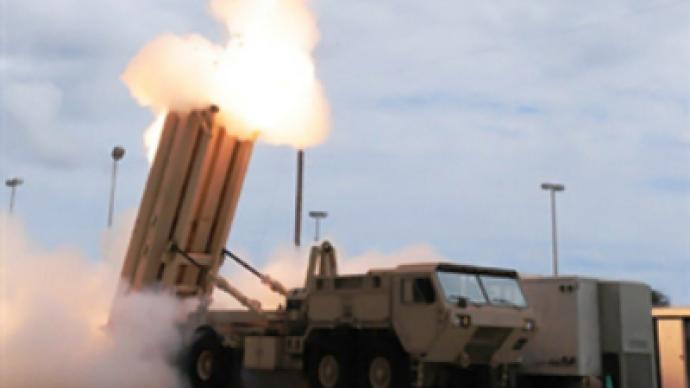Will Obama shoot down Bush’s missile dreams during Moscow visit?

The Bush administration had big plans for Poland and Czech Republic to host a US missile defense system - despite Russia’s objections. Will Obama retreat on AMD or follow his predecessor’s footsteps?
The upcoming talks between US President Barack Obama and Russian President Dmitry Medvedev contain an inherent contradiction: On the one hand, Moscow and Washington are looking to renew the Strategic Arms Reduction Treaty (START-I) that is due to expire in December.
This landmark agreement between the Cold War foes was responsible for relegating many nuclear missiles to the scrapheap, while ensuring de jure that Ukraine, Kazakhstan and Belarus surrender their nuclear arsenals to Russia following the collapse of the Soviet Union (Kazakhstan, for example, possessed 1,400 nuclear warheads, as well as silos and testing facilities at the time of the Soviet collapse).
While it is certainly delightful that the United States and Russia are serious about reducing their nuclear arsenals, the entire deal hangs on another issue: Washington’s ongoing efforts to build elements of its anti-missile defense system in Eastern Europe. In other words, the START treaty sounds great until it is realized that one of the parties, in this case the United States, is hoping to sneak through a weighty shield to accompany its already deadly nuclear sword.
The move towards creating an anti-missile defense system began in earnest on June 13, 2002 when the United States suddenly withdrew from the 30-year-old Anti-Ballistic Missile Treaty, citing the need to defend against rogue states. The only problem with that logic is that there are no rogue states that pose a real threat to Europe.
Few people would disagree with the comment that Iranian President Mahmoud Ahmadinejad is one of the leading nuisances on the global stage. Not only is he loathed by much of the world, but the massive protests that followed his allegedly fixed reelection show that he does not have much of a fan base at home either.
However, it should not be forgotten that the real reason this odious man was able to win over Supreme Leader of Iran Ali Khamenei – who holds the highest constitutional office in Iran – was due to the reckless behavior of the Bush administration.
At the time of the outbreak of the Iraq war on March 20, 2003, Iran was ruled by the liberal reformer, Mohammad Khatami (1997-2005) and not causing anybody much grief. But with America’s ill-advised ‘occupation of Iraq’ the political landscape of the Middle East was dramatically altered overnight. Although Iraq and Iran have long been sworn enemies, Iran was naturally more content with Saddam Hussein hunkered down between the Tigris and Euphrates than George W. Bush, the former US president who ranked Iran (together with Iraq and North Korea) as a member of the notorious Axis of Evil club.
Putting into perspective the past and how we got where we are now does little to minimize any immediate danger that Iran may represent. However, the huge street protests that accompanied last week’s presidential elections show that Tehran will have to start reckoning with public opinion – or suffer the consequences. In other words, the heated rhetoric that had been coming out of Iran, which was mostly in response to America’s own saber rattling, promises to become increasingly diminished over time. In fact, the very image of Ahmadinejad conceals the fact that the Iranians are a very civilized, even sophisticated people that will never tolerate terror for terror’s sake.
That leaves North Korea, the pariah communist state that loves to hog the limelight whenever it can. Although this stunted nation continues to behave irrationally with an occasional missile test launch, Chairman Kim Jong-il is certainly not crazy enough to fire missiles, even if they had such a range, which they don’t, over Russian territory in order to hit Europe.
So if Washington really believes that Iran and North Korea are immediate threats to Europe (Europe, incidentally, doesn’t seem nearly as hysterical as Washington does about the prospects of a rogue attack), is alienating Russia really the best way to defend the continent? In reality, such an ill-conceived strategy, if fulfilled, will only increase the number of missiles pointed at Eastern Europe.
How should Obama approach the ‘besieged fortress?’
One thing is clear: Before Moscow and Washington can speak about hitting the metaphorical “reset” button, Washington must step away from the rhetorical fire button. Russia’s military brass is saying in practically one voice: ‘Let’s stop the game of charades and just call a spade a spade.’ The anti-missile defense system is an offensive – as opposed to defensive – system that the neoconservatives in the Bush administration had hoped would finally give them a way out of the “mutually assured destruction” scenario that has confounded military strategists since the Soviets first tested its own nuclear weapon in August of 1949. In short, “full spectrum dominance,” as this demented military fantasy is deemed in military circles.
The Russians are absolutely right to assume, even if the assumption turns out to be incorrect, that the AMD system compromises its national security. Any observers who ridicule this notion are only deceiving themselves and their wide-eyed audiences.
“Moscow fiercely opposes the American missile defense system,” writes an incredulous Ariel Cohen of the Heritage Foundation, a Washington think tank. “The 10 interceptors that the U.S. is planning to deploy would not have an appreciable impact on the strategic balance of forces, which includes thousands of warheads deliverable by the Russian strategic triad: ballistic missiles, bombers, and submarines.”
Cohen fails to understand, or refuses to acknowledge, that Moscow is more worried about the trend, as opposed to the isolated incident. While it is true that Russia’s Strategic Rocket Forces would quickly overwhelm the planned interceptor missile defense batteries in Poland, together with the interoperable radar system in the Czech Republic, the Russians, who know a thing or two about survival, are thinking about their long-term security.
Military strategy, of course, is obliged to consider the present as well as the future; like the game of chess, the generals must consider the future implications of their immediate moves.
The US missile system, although not without its inherent design flaws (swatting a missile out of the sky with another missile is roughly the equivalent of hitting a bullet with another bullet – tricky science, of course, but not impossible), promises, like all technology, to evolve and improve. Moreover, the system is already bolted down in other spots around the globe.
The US anti-missile defense system is based in Alaska and California in the United States; at Fylingdales, an intelligence-sharing facility between the US and UK on British soil (motto: “Vigilamus,” translation: ‘we are watching’); at Kwajalein Atoll in the Marshall Islands, with plans for another station in Greenland. Meanwhile, Japan also has highly advanced anti-missile technologies.
As for the anti-missile missiles, or interceptors, 40 of them have found a home in Alaska (some 300 miles across the Bering’s Strait from Russia), while another dozen are located in California. Given the geographical locations of this existing hardware, it is obvious that it is not intended to defend against distant rogue states.
How does the United States respond to Russian fears that the system, based as it is in Russia’s geopolitical backyard, is really aimed at Russia? Well, the United States has gratuitously offered Russian personnel the freedom to serve as observers inside of the still-hypothetical Poland and Czech facilities. This is comparable to the Soviet Union during the Cuban Missile Crisis offering to detonate the desperate situation with the presence of American officers inside of the Soviet bases. It is ridiculous to the point of insulting to think that such a suggestion would placate any sovereign nation over fears about their national security. But the Russian president has remained cool in the face of this potential threat.
“We will not be hysterical about this, but we will think of retaliatory steps,” Russian President Medvedev warned.
And indeed they have. After all, the US missile defense system may not even work, but Russian missiles aimed at Europe from Kaliningrad, as has been bandied about by Russian generals, certainly will. Thus, it is nothing more than the worst foreign and military policy to alienate Russia, a proven ally in the war on terror (as well as many other wars in the past, while recalling that Russia and the US, despite some nasty potholes in the road, have never been battlefield adversaries) on the assumption that some rogue country may or may not launch an attack on Europe. It is the hope here that Obama will abandon the Bush warpath and fight any potential threat to the European continent in a way that has historically proven most effective: with Russia firmly at its side.
The Russian delegation offered a far more realistic compromise to the US AMD plan: let the United States build their anti-missile missiles and radar system in Azerbaijan, where Russia already has a radar station at Gabala. The United States, not surprisingly, was extremely cool to the idea, despite the fact that Azerbaijan shares a border with Iran (!). To build this system at such close range would have far better chances of knocking down any hypothetical Iranian missile launch at the earliest launch phase.
There are other reasons why Russia believes that the system is designed with them, not some rogue nation, in mind. In the heat of the 5-day Georgian war, after Tbilisi had launched a desperate attack on Tskhinvali, South Ossetia, the United States and Poland, taking advantage of wildly one-sided news reports that blamed Russia for the conflict, sealed the AMD in Warsaw. Russia immediately cut all ties with NATO. Full story
Moscow’s envoy to NATO Dmitry Rogozin told Russian media that the timing of the deal proved that Moscow, rather than Iran, was the target of the missile shield plans.
Summit dreams and caviar nights
In their upcoming summit in Moscow, Medvedev and Obama will focus undue attention on the question of US missile defense in Eastern Europe, this much is certain. Indeed, it seems only natural that the question of US AMDs would dominate the beginning of the talks. After all, Russia will never commit to renewing START-I without the elimination, or drastic tailoring, of the missile plans.
But there are early indications that Obama, as has been the case many times already in his nascent presidency, will follow in the footsteps of his predecessor and insist on AMD in Europe. US House Committee on Foreign Affairs Howard Berman was in Moscow at the weekend where he seemed overly optimistic that the AMD plan would not lead the START talks to a “dead end.”
In the past, Obama said that he would only consider implementing the AMD system in Europe if it “proved an effective weapon.” Those are certainly not the words that the Kremlin will be looking forward to hear in Moscow next week. It suggests that Obama will base his decision not on the damage that the missile defense system will do to US-Russia relations, but on whether or not the system works.
Meanwhile, Russian Foreign Minister Sergey Lavrov was much more committed to the idea of a “linkage” between the US AMD plan and the START talks.
“Naturally, such a link is necessary,” Lavrov said. “The missile defense – strategic offensive weapons link was delivered in the London statement,” referring to Obama and Medvedev’s first meeting that took place in the British capital in April.
But there are many issues on the plate of both leaders, and it possibly bodes very well for a successful summit that Kyrgyzstan agreed, with Moscow’s blessing, to continue the American military’s use of its transport corridor into Afghanistan that had been threatened to be denied them.
Whatever the case may be, it will be very interesting to see how Barack Obama – who constantly finds himself stuck at the crossroads of his political ambitions and the dubious inheritance of the Bush administration – will respond to what promises to be a most intense Russian visit.












